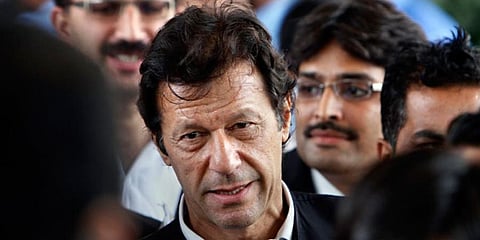

The Covid-19 pandemic is testing the capacity of most states to enforce their writ, especially in the context of social distancing and lockdowns. The challenge seems to be all the more daunting in federal states run on the principle of division of power between federating units.
Take the US, a supposedly model federation pegged on division of state power, as an example to illustrate the point. The scene there is utterly chaotic, with Democrat-run states sticking to the WHO guidelines on social distancing, while Republican-led states are brazenly defying it—on prompting, surprisingly, from the President himself.
PM Narendra Modi has been exceptionally lucky in India in enforcing his command to lock down the country. His edict—that gave only a small window to the people—went through with remarkable success, despite some obvious discomfort and initial suffering to the masses.
Imran Khan hasn’t been that lucky in Pakistan with his ‘smart lockdown’ mantra anchored in selective shut down of populated areas, while leaving essential services and sectors of economy running as usual. The provincial government of Sindh, run by the opposition Pakistan Peoples Party, openly defied his wish of a ‘smart lockdown’ and enforced, instead, a general lockdown, a la the Modi model, in its urban areas. This virtually paralysed the city of Karachi, the economic motor of Pakistan, with a population of 22 million.
It took a lot of political savvy on Imran’s part to bring the renegade Sindh government in line behind his ‘smart lockdown’. But as soon as he won that battle, a bigger challenge propped up. This time the gauntlet was thrown from a bevy of prominent clerics and mullahs belonging to some of Pakistan’s leading religious parties and groups.
Pakistan, of its own volition, is an ideological state with Islam underpinning its raison d’etre. So, it’s not surprising, at all, for one to imagine the power of the pulpit and the enormous following religious leaders enjoy there among the masses.
The clerics wanted Imran to allow usual prayer gatherings in mosques—otherwise declared off-limits in deference to WHO directives to shun any kind of gatherings, especially in closed spaces—in the holy month of Ramadan, which started from April 25.
Ramadan is the most important month in Islam’s calendar. It’s not only a period of month-long fasting—from sunrise to sunset—but also of nightly congregation in mosques for special offering of prayers, called Taraweeh.
Imran was faced with a real dilemma. His smart lockdown has been successful in the sense that Pakistan, with a population of 220 million, has relatively far fewer coronavirus cases than initially anticipated. The number of those who tested positive is around 21,000, with less than 500 deaths and a recovery rate 11 times that of mortalities. The demand from the ‘maulvi brigade’—as some social media pundits derisively referred to the clerics—posed a threat to the effort to contain the contagion’s spread.
Besides, Pakistan isn’t the only Muslim state in the world; there are around 50 other states with Muslim majorities and almost all of them have shut down mosques temporarily to escape the virus scourge. Saudi Arabia—the Muslim world’s heart and home to the two holiest shrines of Islam—has locked down both the Kaaba (God’s Home) in Mecca and the Holy Prophet’s mausoleum in Medina. Al-Azhar, the Islamic world’s cradle of learning and research in Cairo, Egypt, has decreed that mosques would remain off-limits under the pandemic.But Imran still relented to the clerical demand and entered into a 20-point calibrated agreement with them that mandated social distancing and observance of the necessary sanitary and hygienic requirements prevailing the world over to fight the pandemic and level its curve.
Imran’s critics though accused him of buckling under the mullah arm-twisting because, one, of his own religious streak and, two, the strong influence of his wife, said to be an occultist. They feared he had wagered the nation’s well-being against the scourge by succumbing to the mullah backlash.
A survey by an NGO, Pattan Development Organisation, conducted over three nights of Ramadan seems to prove skeptics of Imran’s gamble right.
It observed 194 mosques in 15 cities of Punjab, Pakistan’s most populous state with 65% of its population, and concluded the agreement between the clerics and government was observed more in defiance. It found 89% of worshippers were not wearing mandatory masks, 72% did not keep the required six feet distance and in nearly two-thirds of the mosques, children were among the worshippers.
This one early survey—from only one part of Pakistan—may be insufficient to judge Imran’s dicey deal with the clerics. But this early straw in the wind shines a light on how a carefully crafted agreement could unravel. Imran’s detractors are, in shrill voices, fearing a spike in the number of virus cases. Only the coming days would tell if the Pakistani PM has given in too much to pulpit power. This is not a happy Ramadan for him.
Karamatullah K ghori
Former Pakistani diplomat
Email: K_K_ghori@hotmail.com